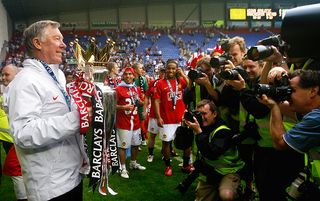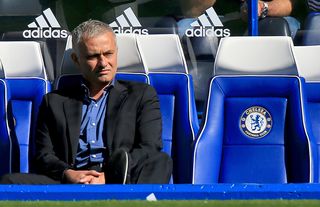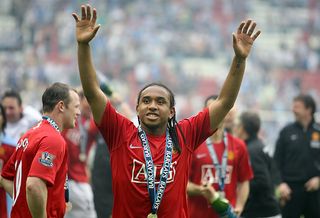Why is it so difficult to retain the Premier League title?
With champions Chelsea languishing in the bottom half of the table, Alex Hess examines why English sides struggle to win consecutive championships...

Of UEFA’s five top-ranked European leagues, only Spain’s – with six successful title defences – boasts fewer instances than England over the same time frame
It’s a mystery worthy of a second season of Serial: why is defending the title so tough? Given the tiny concentration of power at the top end of English football, the rarity with which a club manages to do so is faintly bizarre. After all, basic logic dictates that if you're the best team in the country one year, you should stand a pretty good chance the next year, too. Yet when it comes to title defences, England’s top flight creates its own logic. The Premier League’s inception 23 years ago may have narrowed competition at the top down to all but a moneyed few but, despite only five clubs having lifted the newly branded trophy, successive titles have been won on just seven occasions. Of UEFA’s five top-ranked European leagues, only Spain’s – with six successful title defences – boasts fewer instances than England over the same time frame. Factor into this that only once in the last 32 years has a team not managed by Alex Ferguson managed to win consecutive titles – hell, factor in that it’s only been defended 10 times since peace broke out in Europe – and the trophy suddenly seems as though it should be presented with a money-back guarantee.

Avoiding complacency
Success was breeding complacency. Too many people round the club were becoming intoxicated with the treble, it was undermining us
The fact that Jose Mourinho is the only modern-era magician to have pulled off Ferguson’s trademark trick lends a tinge of irony to the abject incompetence with which his side have begun the current campaign – although they’re not the first team to respond to their own title win with an impulsive swipe at the self-destruct button. Manchester City in particular have become instant specialists in this collective case of ‘second season syndrome’, following up both of their scintillating title wins with campaigns that saw glitzily assembled squads limp ruefully over the finish line.
RECOMMENDED Chin up Chelsea: 8 other terrible English top-flight title defences
If the musical careers of the Baha Men tell us anything, it’s that while success is one thing, sustained success is something else completely. Whether that band ‘lost their hunger’ after their first taste of table-topping glory remains unconfirmed, but it’s certainly the default diagnosis for title-winning footballers.
It’s something Mourinho himself hinted at over the summer: “Give a little bit more competitiveness to the squad, bring some new blood in, put some players a little bit under pressure. So they know they have someone waiting. Now they’re the champions, I need that.”

This assumption that elite players will incline towards sloven complacency unless urged otherwise is a curious one, if not necessarily untrue. You’d imagine that if anyone is immune to mental shortfalls, it would be a squad of league winners, although perhaps not every top-level sportsman possesses the same “inner determination to avoid failure” that Ferguson references as key to his own continued dominance.
Get FourFourTwo Newsletter
The best features, fun and footballing quizzes, straight to your inbox every week.
Indeed, first-hand evidence tells us even the most hardened winners can be prone to letting up – and that the greater the success, the greater the risk of self-satisfied negligence. In his first book, Roy Keane describes Manchester United’s feted 1999 season as equal parts gift and curse: “Success was breeding complacency. Too many people around the club were becoming intoxicated with the treble, it was undermining us. I knew it. We were kidding ourselves, talking big but not delivering.”
Tactical tinkering
There’s also the very real likelihood that points are genuinely harder to come by as reigning champions. “Everyone wanted to beat us,” recalled John Terry of Chelsea’s first such experience a decade ago. “Teams are up for it, they sit back behind the ball.”
Ferguson’s regeneration exercise makes Chelsea’s most recent summer of transfer business seem – in the truest traditions of minimalism – impossible to make any sense of
The replenishment process may therefore be as important tactically as it is psychologically. United’s title win in 2006/07, for instance, was quickly followed up by the signings of Owen Hargreaves, Nani, Anderson and Carlos Tevez, a summer influx that not only stopped various regulars getting overly comfortable in their first-team seats but had tangible on-pitch effects, too.
It was a classic case of proactive, success-driven renewal and United went on to claim the next two league trophies off the back of it (not to mention the 2008 Champions League, where all four recruits played in the final and converted penalties).

Certainly, Ferguson’s regeneration exercise makes Chelsea’s most recent summer of transfer business seem – in the truest traditions of minimalism – impossible to make any sense of. Common sense suggests that the country’s best team should have the least need to strengthen; often, the opposite is true.
Perhaps the moment when Arsene Wenger turned from grizzly medal winner to wide-eyed also-ran was when he decided that the summer following Arsenal’s Invincibles season was best spent adorning his squad’s peripheries rather than reinforcing its core. To his bench was added Manuel Almunia, Mathieu Flamini and a 20-year-old Robin van Persie while all else stayed the same, and his side duly finished 12 points behind Chelsea the following May. Arsenal have not finished in the top two since.
Fatal fatigue
But for all the talk of sated hunger, perhaps a more pertinent factor is outright exhaustion. The sustained intensity – physical and mental – required to stay switched on and in form throughout a 38-game season is no mean feat. To do so under the glare of modern football’s global spotlight, all the while dealing with European commitments and often an international tournament, makes things triply draining once the following campaign gets underway. Jesse Owens would stand as one of the fastest sprinters of all time if the cinder tracks he ran on in the 1930s didn’t absorb energy in a way today’s synthetic surfaces don’t; Premier League title holders must often feel as though they’re running along their very own cinder track.

And in sport’s elite-level world of marginal gains, even a small lapse can open up a huge shortfall – see how a mere month of poor form left Chelsea with a near-unbridgeable 11-point deficit. Without a doubt, defending a title brings its own unique set of hurdles.
Rise of the middle class
It may not be getting any easier, either. The fresh torrent of TV money flooding into England’s top flight has seen a recent mass migration of high-pedigree stars to the division’s middling clubs. It’s good news for the little guys but, with the Premier League’s top clubs remaining stuck the wrong side of velvet rope that cordons off the continent’s true crème de la crème, their own room for improvement is staying the same.
"The good financial situation that every [Premier League] club has allows even the smaller teams and the promoted teams to get good players, have good squads and to be competitive," says Mourinho.
And for once, the Portuguese prankster’s words bear a genuine correspondence with real life. We need only cast a glance towards Upton Park (or rather to West Ham’s trips to the Emirates, Anfield and the Etihad), to see a demonstration of the mid-table’s growing ability to rob from the rich, while it is notable that Everton, Crystal Palace and Swansea have taken themselves to eight points above Mourinho’s champions.
English football may have been reunited with the only man still working to have retained the championship in the last 30 years. But it may be wise not to expect him – or anyone else – to repeat the trick anytime soon.
RECOMMENDED NEXT
- PSEUDONEWS Chelsea handed three-match persecution complex
- FEATURE Louis van Gaal's friends and foes: a who's who guide
- PSEUDONEWS RSPCA rescues Gunnersaurus from Emirates Stadium

Thank you for reading 5 articles this month* Join now for unlimited access
Enjoy your first month for just £1 / $1 / €1
*Read 5 free articles per month without a subscription

Join now for unlimited access
Try first month for just £1 / $1 / €1
